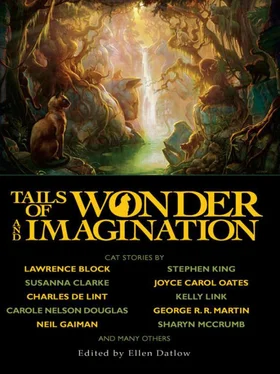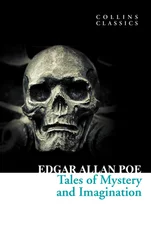Ellen Datlow - Tails of Wonder and Imagination
Здесь есть возможность читать онлайн «Ellen Datlow - Tails of Wonder and Imagination» весь текст электронной книги совершенно бесплатно (целиком полную версию без сокращений). В некоторых случаях можно слушать аудио, скачать через торрент в формате fb2 и присутствует краткое содержание. Год выпуска: 2010, ISBN: 2010, Издательство: Night Shade Books, Жанр: Фэнтези, Фантастика и фэнтези, Ужасы и Мистика, на английском языке. Описание произведения, (предисловие) а так же отзывы посетителей доступны на портале библиотеки ЛибКат.
- Название:Tails of Wonder and Imagination
- Автор:
- Издательство:Night Shade Books
- Жанр:
- Год:2010
- ISBN:978-1-59780-170-6
- Рейтинг книги:5 / 5. Голосов: 1
-
Избранное:Добавить в избранное
- Отзывы:
-
Ваша оценка:
- 100
- 1
- 2
- 3
- 4
- 5
Tails of Wonder and Imagination: краткое содержание, описание и аннотация
Предлагаем к чтению аннотацию, описание, краткое содержание или предисловие (зависит от того, что написал сам автор книги «Tails of Wonder and Imagination»). Если вы не нашли необходимую информацию о книге — напишите в комментариях, мы постараемся отыскать её.
collects the best of the last thirty years of science fiction and fantasy stories about cats from an all-star list of contributors.
Tails of Wonder and Imagination — читать онлайн бесплатно полную книгу (весь текст) целиком
Ниже представлен текст книги, разбитый по страницам. Система сохранения места последней прочитанной страницы, позволяет с удобством читать онлайн бесплатно книгу «Tails of Wonder and Imagination», без необходимости каждый раз заново искать на чём Вы остановились. Поставьте закладку, и сможете в любой момент перейти на страницу, на которой закончили чтение.
Интервал:
Закладка:
Pretty soon the doctor’s car pulls up beside me. Since the top is down, as usual, I see right away the old man is in the car with him. The old man tells me to get in. If he’s there, I guess it’s all right. Though maybe the doctor will see that we both end up stuck in what might as well be the pound for people. The car’s only a two seater. I have to sit on the old man’s lap, his arms around me. It’s a nice place to be.
But then a huge dark cloud comes towards us right down the road. Like a huge, huge dust devil. And it’s full of flowers! And the sound. Here comes the disaster. Finally. I’m actually glad that something’s happening at last. I don’t have Natty to hug, but I do have the old man’s arms around me nice and tight.
The doctor stops the car and starts putting the top up, but at the last minute the disaster veers away, rises, then dissipates in a rain of flowers. Flowers all over us, wet and fragrant.
We’re all out of breath though we haven’t done anything but just sit here. We look at each other… even the doctor. I look into the old man’s black eyes. And turn away fast. I’m thinking: that’s where all his calmness comes from. Down in there somewhere.
Again, I wonder what his name is.
The doctor drives us—much too fast even for the desert—into town.
At the pound they say, “That skinny old marmalade cat? He was an odd one.”
“Well, where is he?”
“He got out. Just today. We don’t know how he did it.”
I always knew he was smarter than most but now I wish he wasn’t. I sit down on the curb.
The old man says it. “Smart cat.” Then, “He’ll come back.”… his slow raspy voice. “They always do.”
It’s a reassuring voice and nice to hear it, but it doesn’t reassure me.
The old man sees that. “He will !”
The doctor says, “It’s a cat, for Heaven’s sake. You’ll be fine without it.”
How dare he? Of course I won’t be fine.
I stand up and attack him again. I land two good blows before anybody can do anything.
But he slaps me down.
“The town wants you in the shelter. You’re a nuisance and an eye sore. Look at yourselves.”
The old man pushes him away and gets punched and falls backwards. That makes me so mad I get up and fight even harder. It doesn’t do any good. I’m on the ground again beside my man.
But there’s a great yowling and howling and here, off the roof of the pound comes an orange ball of claws, down on the doctor’s head. And a terrible racket. I’ve heard cats can do that, but I never actually heard the sound before.
The doctor tries to run away, but you can’t run away from a cat on your head.
He’s around the block and out of sight but we can still hear Natty.
We look at each other again, and this time I let myself look… way down in there.
He nods and then I nod.
He takes my hand. (How strong and calloused both our hands are. Like pieces of sandpaper.)
We sit down and wait for Natty to come back.
“You know there is no safe place,” he says.
And I say, “I know it.”
“And not all disasters are that bad.”
And I say, “I know it.”
Pretty soon Natty comes swaggering back.
We walk to our things, me with Natty on my shoulder.
“Let’s go on.”
“Till we get to a nice green place with a river?”
“And trees.”
“And a hill to be on top of?”
“And a cottage.”
I wonder what his name is.
NINE LIVES TO LIVE
Sharyn McCrumb
Sharyn McCrumb is an award-winning Southern writer, best known for her Appalachian “Ballad” novels set in the North Carolina/Tennessee mountains, including the New York Times best sellers She Walks These Hills and The Rosewood Casket. Her other best-selling novels include The Ballad of Frankie Silver and The Songcatcher . Her most recent novels are The Devil Amongst the Lawyers and Faster Pastor , the latter co-authored with NASCAR driver Adam Edwards. McCrumb was named a “Virginia Woman of History” in 2008 for Achievement in Literature. Other honors include: AWA Outstanding Contribution to Appalachian Literature Award; the Chaffin Award for Southern Literature; the Plattner Award for Short Story; and AWA’s Best Appalachian Novel. She lives and writes near Roanoke, Virginia.
She says: “The inspiration for ‘Nine Lives to Live’ was an elderly, dignified Maine Coon Cat, who belonged to a friend of mine. The expression on that cat’s face suggested that he disapproved of us, that he outranked us, and that he was not amused. So I started wondering who he used to be. (I want to come back as a groundhog. They eat constantly all summer, and when they get fat, they’re cute. Then when the weather turns cold and wet, they crawl into the burrow and go to sleep until it’s warm and sunny outside again. And when they wake up—they’re thin !—People say dolphins are the smartest animals on earth, but groundhogs have things figured out pretty well, if you ask me.)”
It had seemed like a good idea at the time. Of course, Philip Danby had only been joking, but he had said it in a serious tone in order to humor those idiot New Age clients who actually seemed to believe in the stuff. “I want to come back as a cat,” he’d said, smiling facetiously into the candlelight at the Eskeridge dinner table. He had to hold his breath to keep from laughing as the others babbled about reincarnation. The women wanted to come back blonder and thinner, and the men wanted to be everything from Dallas Cowboys to oak trees. Oak trees? And he had to keep a straight face through it all, hoping these dodos would give the firm some business.
The things he had to put up with to humor clients. His partner, Giles Eskeridge, seemed to have no difficulties in that quarter, however. Giles often said that rich and crazy went together; therefore, architects who wanted a lucrative business had to be prepared to put up with eccentrics. They also had to put up with long hours, obstinate building contractors, and capricious zoning boards. Perhaps that was why Danby had plumped for life as a cat next time. As he had explained to his dinner companions that night, “Cats are independent. They don’t have to kowtow to anybody; they sleep sixteen hours a day; and yet they get fed and sheltered and even loved—just for being their contrary little selves. It sounds like a good deal to me.”
Julie Eskeridge tapped him playfully on the cheek. “You’d better take care to be a pretty, pedigreed kitty, Philip.” She laughed. “Because life isn’t so pleasant for an ugly old alley cat!”
“I’ll keep that in mind,” he told her. “In fifty years or so.”
It had been more like fifty days. The fact that Giles had wanted to come back as a shark should have tipped him off. When they found out that they’d just built a three-million-dollar building on top of a toxic landfill, the contractor was happy to keep his mouth shut about it for a mere ten grand, and Giles was perfectly prepared to bury the evidence to protect the firm from lawsuits and EPA fines.
Looking back on it, Danby realized that he should not have insisted that they report the landfill to the authorities. In particular, he should not have insisted on it at six p.m. at the building site with no one present but himself and Giles. That was literally a fatal error. Before you could say “philosophical differences,” Giles had picked up a shovel lying near the offending trench, and with one brisk swing, he had sent the matter to a higher court. As he pitched headlong into the reeking evidence, Danby’s last thought was a flicker of cold anger at the injustice of it all.
Читать дальшеИнтервал:
Закладка:
Похожие книги на «Tails of Wonder and Imagination»
Представляем Вашему вниманию похожие книги на «Tails of Wonder and Imagination» списком для выбора. Мы отобрали схожую по названию и смыслу литературу в надежде предоставить читателям больше вариантов отыскать новые, интересные, ещё непрочитанные произведения.
Обсуждение, отзывы о книге «Tails of Wonder and Imagination» и просто собственные мнения читателей. Оставьте ваши комментарии, напишите, что Вы думаете о произведении, его смысле или главных героях. Укажите что конкретно понравилось, а что нет, и почему Вы так считаете.












